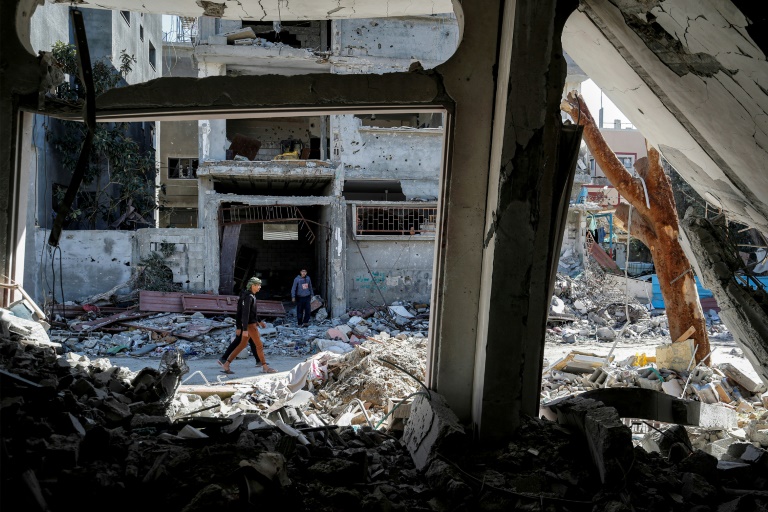Hamas gives ‘initial’ approval to Gaza truce plan as fighting drags on

A man walks past the rubble of a destroyed building in the Maghazi camp for Palestinian refugees, which was severely damaged by Israeli bombardment amid the ongoing conflict in the Gaza Strip between Israel and the Palestinian militant group Hamas
– Fighting in Gaza dragged on into Friday with scores reported killed overnight, after mediator Qatar said Hamas had given its “initial” approval to a hostage-prisoner exchange deal that would pause its war with Israel.
Hamas’s health ministry said 105 people were killed overnight from Thursday to Friday, while the group’s press office reported raids and shelling around Khan Yunis — southern Gaza’s main city and the recent epicentre of hostilities.
Nearly four months of fighting have rendered Gaza “uninhabitable”, according to the UN, while an Israeli siege has led to dire shortages of food, water, fuel and medicines.
The humanitarian crisis, coupled with soaring civilian casualties, has spurred increasing international calls for a ceasefire.
Qatar’s foreign ministry spokesman, Majed al-Ansari, said Thursday that recent talks in Paris between Qatari, US, Israeli and Egyptian officials had yielded a consolidated truce proposal.
“That proposal has been approved by the Israeli side and now we have an initial positive confirmation from the Hamas side.”
Ansari said there were hopes of “good news” about a new pause in the fighting “in the next couple of weeks”.
But a source close to Hamas told AFP on Thursday: “There is no agreement on the framework of the agreement yet — the factions have important observations — and the Qatari statement is rushed and not true.”
A Hamas source had previously told AFP the three-stage plan would start with an initial six-week halt to the fighting that would see more aid deliveries into Gaza.
Only “women, children and sick men over 60” held by militants would be freed during that stage in exchange for Palestinian prisoners in Israel, the source said, requesting anonymity because of the sensitivity of the talks.
There would also be “negotiations around the withdrawal of Israeli forces”, with possible additional phases involving more hostage-prisoner exchanges.
– A deal ‘right now’ –
The war in Gaza was triggered by Hamas’s October 7 attack on Israel, which resulted in the deaths of around 1,160 people, mostly civilians, according to an AFP tally based on official figures.
Militants also seized about 250 hostages, and Israel says 132 remain in Gaza, including at least 27 believed to have been killed.
After the attack, Israel launched a withering offensive that has killed at least 27,019 people in Gaza, mostly women and children, according to the health ministry in the Hamas-run territory.
Visiting Khan Yunis on Thursday, Israeli Defence Minister Yoav Gallant told troops that the local Hamas brigade had been “dismantled” and that the “same will happen in Rafah”, the southern border town where hundreds of thousands of displaced civilians have fled.
“(Hamas) don’t have weapons, they don’t have ammunition, they have 10,000 eliminated terrorists and another 10,000 terrorists who are wounded and not functioning. This is a serious blow that erodes Hamas’ abilities,” he said.
Gallant also reiterated the government’s long-standing position that only military means could ensure Israeli captives’ release, telling troops their operations “bring us closer to enabling the return of the hostages, because Hamas only responds to pressure”.
However, domestic calls for a ceasefire and hostage deal have mounted, with protesters gathering again in Tel Aviv on Thursday night carrying placards featuring hostages’ faces and slogans such as “No more bloodshed”.
“This government, our leadership, needs to make decisions and they need to be brave,” said activist Moran Zer Katzenstein. “We need them to bring the hostages back, right now.”
“The only way is through a deal,” she added.
– Settler sanctions –
Violence has also flared in the occupied West Bank, where more than 370 Palestinians have been killed by Israeli troops and settlers since October 7.
The United States on Thursday imposed sanctions on four Israeli settlers over the violence, in a rare US move against Israelis. Any assets they hold in the United States will be blocked, with Americans forbidden from financial transactions with them.
“The situation in the West Bank — in particular high levels of extremist settler violence, forced displacement of people and villages, and property destruction — has reached intolerable levels and constitutes a serious threat to the peace, security and stability of the West Bank and Gaza, Israel, and the broader Middle East region,” President Joe Biden said in an executive order laying the groundwork for US actions.
The war in Gaza has also given rise to an increase in attacks by Iran-backed allies of Hamas across the Middle East, drawing in US forces among others.
American forces shot down a drone of unspecified origin off Yemen on Thursday, and later destroyed an explosives-laden uncrewed surface vessel attributed to Huthi rebels that threatened ships in the Red Sea, the US military said.
The US Central Command (CENTCOM) also said Yemen’s Iran-backed Huthis had launched two anti-ship missiles that were possibly aimed at a cargo ship in the Red Sea, though they did not hit the vessel.
The United States had destroyed 10 Huthi drones and a ground control station shortly after midnight local time on Thursday.
The Huthis began targeting Red Sea shipping in November, saying they were acting in support of Palestinians in Gaza.
